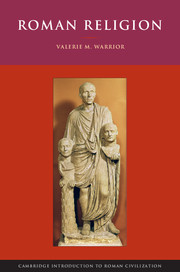Book contents
- Frontmatter
- Contents
- List of Illustrations and Maps
- Preface
- Acknowledgments
- 1 The Gods and their Worship
- 2 Divination, Prayer, and Sacrifice
- 3 Religion and the Family
- 4 Religion and the State
- 5 Religion and War
- 6 The Calendar, Festivals, and Games
- 7 Official Attitudes toward Foreign Cults
- 8 Magic and the Occult
- 9 Becoming a God
- 10 The Jews and Christianity
- Chronology
- Maps
- Gods
- Glossary
- Ancient Sources
- Bibliography
- Illustration Credits
- Index
7 - Official Attitudes toward Foreign Cults
Published online by Cambridge University Press: 05 February 2015
- Frontmatter
- Contents
- List of Illustrations and Maps
- Preface
- Acknowledgments
- 1 The Gods and their Worship
- 2 Divination, Prayer, and Sacrifice
- 3 Religion and the Family
- 4 Religion and the State
- 5 Religion and War
- 6 The Calendar, Festivals, and Games
- 7 Official Attitudes toward Foreign Cults
- 8 Magic and the Occult
- 9 Becoming a God
- 10 The Jews and Christianity
- Chronology
- Maps
- Gods
- Glossary
- Ancient Sources
- Bibliography
- Illustration Credits
- Index
Summary
No individual shall take gods for himself, either new or alien ones, unless they have been recognized by the state. Privately they shall worship those gods whose worship they have duly received from their ancestors.
(Cicero, On the Laws 2.19)Notwithstanding the influx into Rome of innumerable foreigners who are under great obligation to worship their ancestral gods in accordance with the customs of their own countries, the city has never officially emulated any foreign practices. But, even though Rome has imported certain rites on the recommendation of oracles, she celebrates them in accordance with her own traditions, banishing all mythical mumbo-jumbo.
(Dionysius of Halicarnassus, Antiquities 2.19)In both republic and empire there are instances of the official adoption of new non-Roman gods, but often after initial resistance and unsuccessful attempts at suppression. The literary sources indicate that new cults were adopted by the state in times of crisis, especially plague or disaster in war. However, since the original infiltration of a new cult leaves little or no trace in the literary or archaeological record, it is quite possible that the literary record of the official adoption of a new cult merely indicates that the state authorities were sanctioning an already prevalent practice. Once a cult had taken hold of the populace, it generally would have been expedient to adapt it by eliminating unacceptable practices, rather than attempt to suppress it.
- Type
- Chapter
- Information
- Roman Religion , pp. 79 - 92Publisher: Cambridge University PressPrint publication year: 2006



